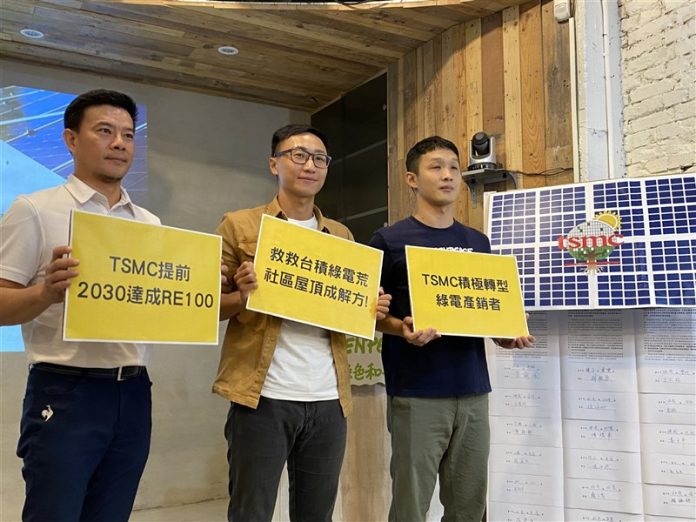Taipei, July 31 (CNA) Greenpeace on Monday urged semiconductor companies to further embrace solar energy, citing a survey that found nearly half of respondents living where Taiwan Semiconductor Manufacturing Co. (TSMC) has or plans to establish operations would be willing to lease their roof for solar panels to be installed.
Along with the 46 percent of people in Tainan, Hsinchu County and City, and Kaohsiung who said they would be willing to rent out their roof space, nearly 70 percent of respondents thought more should be done by semiconductor companies generally to increase the amount of solar energy produced, Greenpeace Climate and Energy Project Manager Chen Yung-jen (陳詠仁) said, citing a survey conducted by the charity in May this year.
Meanwhile, Chen highlighted how 25 village leaders from administrative regions around the Central Taiwan Science Park — where TSMC plants are based — expressed that they would be willing to lead the effort in persuading TSMC to help fund the installation of rooftop solar equipment on unused rooftops.
According to Greenpeace, the combined area of those unused rooftops exceeds 900 hectares, the equivalent of 444 times the size of Taipei Arena.
This could result in a solar panel capacity of up to 900 megawatts, generating approximately 1 billion kilowatt-hours of “green electricity” annually, Chen said.
Chen noted that if TSMC fully utilizes this capacity, the company’s renewable energy use could increase to 15 percent of its total, up from the 10.4 percent reported in the TSMC 2022 Sustainability Report in 2022.
Greenpeace has launched an online petition page which urges all village chiefs across Taiwan to persuade residents to lease their unused rooftops for TSMC’s solar equipment installation, Chen said.
The petition data will be provided to TSMC for reference, the petition page stated.
“The idea is not to single out TSMC, but to urge all semiconductor firms to increase solar energy use. Hopefully TSMC, as the most well known company, can act as the industry leader,” Chen explained.
During the press conference, Chen Kun-hong (陳坤宏), executive director of the Taiwan Photovoltaic Industry Association, said numerous photovoltaic firms in Taiwan have already begun collaborating with local administrative units to develop community rooftop solar projects.
Also at the presser, John Yang (楊仲傑), chief of Tanyang village in Taichung, expressed strong support from villagers in both supporting Taiwan’s renewable energy development and providing green energy to TSMC.
However, he mentioned that the villagers would consider factors such as risk, construction quality, and subsequent maintenance when deciding whether to agree to solar panels being constructed on their rooftops.
Yang also emphasized that if TSMC can hold face-to-face meetings in the future to discuss these matters, it would reassure many villagers and that he believes this approach aligns with TSMC’s social obligations as a major corporation.
TSMC joined the RE100 initiative in 2020, committing to achieve 100% renewable energy usage by 2050.






